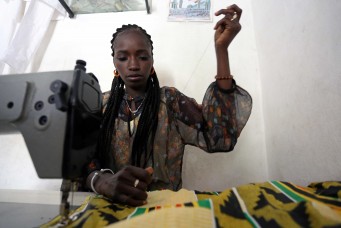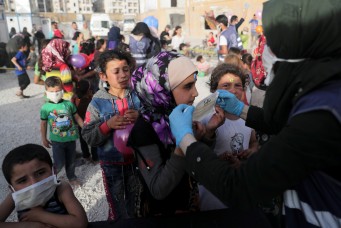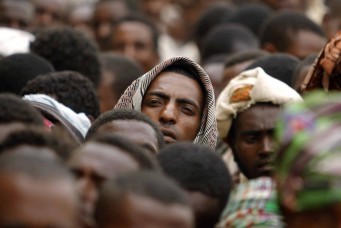Challenges to Migration Governance in the Arab Region
Since its endorsement in 2018, a wealth of challenges have delayed the full implementation of the Global Compact for Migration in the Arab region.

Migrants sit on the side of a road as they wait for work, following the outbreak of the coronavirus disease (COVID-19), during the holy month of Ramadan in Misrata, Libya May 2, 2020. Ayman Al-Sahili/Reuters
In recent years, the Arab world has witnessed unprecedented growth as a region of origin, transit, and destination for millions of migrants. At present, the region is home to 38 million international migrants. This figure includes both voluntary migrants—who leave their countries of origin to seek employment and education, among other other reasons—and forcibly displaced persons, who are fleeing conflict, persecution, or climate change pressures.
Of those 38 million, 24 million are migrants of working age who have emigrated from their country of origin and are employed or seeking employment in their country of residence. Most of those migrant workers are concentrated in Gulf Cooperation Council (GCC) countries of Bahrain, Kuwait, Oman, Qatar, Saudi Arabia and the United Arab Emirates (UAE). Owing to conflict, high unemployment rates, and poverty, the less affluent Arab Least Developed Countries (LDCs) are primarily sources of emigration, and receive only limited flows of immigration.
Migrant workers across the Arab world face a number of structural challenges. Despite the efforts of destination countries to implement and enforce labor protections, many migrants are still susceptible to abuse at the hands of employers. All the more, naturalization is extremely rare in the Arab states, and under existing regulations, access to public services for non-citizens is still highly restricted. In the past few months, the COVID-19 pandemic has exacerbated those challenges and demonstrated the urgent need for effective policies to be set in place.
The virtual launch of the 2019 Situation Report on International Migration, which was held on May 28, thus comes at a critical time. ESCWA Regional Adviser on Population Affairs Sara Salman says the present crisis should “incentivize additional work towards building the resilience of migrants.”
The report, which was published by the International Organization for Migration (IOM) and the United Nations Economic and Social Commission for West Asia (UNESCWA), outlines heterogeneous migration patterns across the region, key policy updates between 2017 and 2019, and identifies priority areas for future progress. Among those priorities are the collection of reliable and accurate migration data; the amendment of citizenship laws; and the implementation of clear, non-discriminatory policy regulating migrants’ access to social security benefits.
Salman opened the discussion with a brief overview of migration trends and patterns in the region. Migrant workers in the Arab world are concentrated in GCC countries, where, according to the International Labor Organization (ILO), non-nationals make up 70 percent of the workforce. Migrant workers to the oil-rich countries hail primarily from India, Pakistan, Bangladesh, and from other Arab countries. The Maghreb, Mashreq, and the Arab LDCs, on the other hand, remain mostly sources of emigration. The top regions of destination for migrants from the Maghreb are Europe and North America; while the majority of migrants from the Mashreq and the Arab LDCs relocate to other Arab countries.
Salman then outlined key policy updates regarding migration governance, noting that Arab states overall have taken important steps towards enhancing protections for migrant workers, increasing avenues for permanent residency, and combatting human trafficking. GCC countries have notably been the most active in implementing migration governance policy.
“The thematic focus of these policies reflects the region’s priorities,” Salman said. Arab governments in the Maghreb, Mashreq, and Arab LDCs are engaging in commensurate measures to tackle the most common drivers of emigration—namely rising unemployment and forced displacement. Meanwhile, governments of the Gulf countries are actively working to enhance protections for labor migrants, particularly with regards to the amendment of the kafala program. Kafala is a sponsorship system whereby migrant workers need to have a sponsor to enter, work in, and in some cases, leave the country.
With regards to the COVID-19 pandemic, Salman explained that it is still difficult to assess how the crisis will affect those migration patterns in the future. Those effects will be explored in the 2021 report which, she assured the audience, is already in the works.
Salman expressed hope that the launch of the 2021 Situation Report would be held under better circumstances, before leaving the stage to IOM Senior Regional Liaison and Policy Officer, Kristina Mejo. Mejo provided attendees with a brief introduction to the guiding principles and objectives of the Global Compact for Safe, Orderly, and Regular Migration (GCM); its network of implementing institutions; and the policy implications of the agreement in the Arab region.
The Global Compact expresses a commitment to the ideal that “migration should unite us, instead of divide us,” Mejo said. The GCM, which was formally endorsed by the UN General Assembly in December 2018, comprises twenty-three objectives and commitments covering “all dimensions of international migration in a holistic and comprehensive manner,” she added.
The agreement provides a roadmap towards the shared goals of UN member states, some of which include: addressing the challenges of migration, harnessing its many benefits, and in ensuring that “migration should never be an act of desperation”.
In May 2018, a few months before the GCM was formally endorsed, the UN decided to establish the Network on Migration as a successor to the Global Migration Group, to assist member states in achieving the objectives of the agreement. The network comprises 38 UN agencies, with the IOM serving as the coordinator and secretariat of the network. Under the auspices of the Working Group on International Migration in the Arab Region, a regional conference on the GCM Implementation and Policy Implications was held in Cairo on December 3, 2019.
The international delegates emphasized a number of regional objectives, including the provision of greater social security to migrants; increased regional collaboration on matters of migration governance; the adoption of an all-of-government approach to policy implementation, and an all-of-society approach in conducting the review by engaging various stakeholders throughout the process. In line with Objective 1 of the GCM, Mejo also stressed the need to increase efforts towards the collection of accurate, reliable data to support evidence-based policy design.
This final sentiment was echoed by Professor Philippe Fargues of the European University Institute, who went on to provide an overview of policy recommendations outlined in the 2019 Situation Report.
“Arab states’ commitment to international tools of migration governance has remained pretty limited,” Fargues said, in what he described as an “an undiplomatic statement so far”.
Indeed, none of the main recipients of labor migration in the region have ratified the 1975 Migrant Workers Convention, nor the 1990 Convention on the Protection of the Rights of All Migrant Workers. Even treaties which have been ratified by the majority of Arab states, he continued, have yet to be fully and adequately implemented.
While the above-mentioned treaties have received heterogeneous approval among Arab states, the GCM has received broad consensus in the region. “Its adoption,” suggests Fargues, “should offer an opportunity for Arab states to strengthen their commitment to international instruments for the government of migration.”
The second recommendation underlined by Fargues focused on developing existing citizenship laws. States, he asserted, should continue to amend citizenship laws to allow for the naturalization of selected long-term residents. Those amendments should be made in line with Objective 16 of the GCM, which is to “empower migrants and societies to realize full inclusion and social cohesion”. Social cohesion is the situation in which migrants are well integrated into society in their country of destination. He argued that, in many Arab countries, locals are largely open and welcoming toward migrants. In such countries, social cohesion is often easily and organically achieved.
Full inclusion, on the other hand, is achieved when migrants share similar rights and duties to those of citizens in the host country. Here, he noted a discrepancy between the openness of societies and the more restrictive nature of citizenship laws. The most complete form of inclusion is when a migrant acquires citizenship in their country of destination. Due to existing legal restrictions, this is largely uncommon in Arab countries. All the more, even where naturalization is permitted, its long-term benefits are often delayed by lengthy probation periods. As such, immigration in the Arab region tends to produce “continuously growing sub-populations of non-citizens,” who can never claim the full rights and duties of citizenship. As noted in the Situation Report, amendments to citizenship laws could not only better allow for the achievement of GCM objectives, but also further enable countries to reap the full development benefits of migration.
Fargues’s third recommendation highlighted the importance of healthcare. The Situation Report urges Arab countries to “consider granting long-term migrants all the rights guaranteed to citizens”. These rights should include those defined in Article 25 of the Universal Declaration of Human Rights, notably, access to medical care. Migrant workers count among those most susceptible to the effects of COVID-19, for a number of social and structural reasons.
“Migrants are over-exposed to work-related injury and disease in the destination countries,” said Fargues, and this is due to a number of reasons, first of which is the nature of their work. In the Arab world, large proportions of migrant workers are employed in the oil and gas industry, in construction, and in domestic work. As such, they are likely to be in frequent contact with large crowds of potentially infected persons. Second, he continued, low-waged workers often suffer from precarious housing conditions, poor nutrition, and lack of access to sanitation. Third, the recent crash in oil prices has left many labor migrants unemployed, particularly in the GCC countries. Now more than ever, access to healthcare facilities is crucial for migrant populations.
Laws regulating the provision of medical services to migrant workers vary across the region, which Fargues says can be divided into four categories. The first category comprises countries where the state is fully in charge of a migrant’s healthcare expenses. The only Arab country in this category is Morocco, where all residents are legally entitled to free public primary healthcare services. The second category comprises countries where employers are in charge of migrant workers’ health expenses. This includes all GCC countries except Oman. The third category, which includes only Oman, comprises countries where migrants are partially responsible for their healthcare expenses.
The fourth and final category comprises countries where regulations on migrants’ access to healthcare are unclear. This includes Egypt, Iraq, Jordan, Libya, Lebanon, Palestine, Syria, Mauritania, Sudan, Tunisia, and Yemen. “Here,” said Fargues, “we have a strong recommendation: states must define clear, non-discriminatory policies to support migrants’ access to healthcare.”
Fargues further stressed the particular challenges faced by migrant domestic workers. GCM Objective 7 urges countries to develop “gender-responsive migration policies to address the particular needs and vulnerabilities of migrant women, girls and boys”. The majority of registered migrant women in the GCC and Mashreq countries are employed in the domestic sector, where, according to the ILO, they remain one of the least protected groups of workers under labour legislation.
“Domestic workers fall within a legal gray zone,” said Fargues. “They are part of the household, but they are not members of the family.” Therefore, neither labor nor family laws apply to them.
Those migrants are at particular risk in countries where the kafala system is enforced. Very often, a kafeel (or sponsor) will exert further control over the migrant by imposing illegal recruitment fees which leave the worker deeply indebted; or by confiscating their travel documents. The system, which is still active in the GCC was initially devised in the 1950s to allow rapidly rotating labor into the country and contribute to economic growth. It has since left numerous migrants exposed to abuse at the hands of their employers, and has been widely condemned by international organizations and civil society groups.
To counter those abuses, many GCC countries are in the process of reforming or altogether eliminating the kafala system. Some have already taken active steps towards improving the situation of migrant domestic workers. As Fargues noted, Kuwait, for instance, took an important step in 2018 by transferring the competencies of the Interior Minister regarding the employment of domestic workers to the Public Authority for Manpower. This, he says, is crucial in that domestic workers are now officially recognized as members of the workforce. They are therefore subject to labor laws and protections.
But it all boils down to implementation. The question of whether states can sustain their commitment to the Global Compact under current circumstances was raised by several attendees during the Q&A portion of the event. As Mejo aptly noted, while the COVID-19 pandemic is first and foremost a health crisis, states should “look through the GCM lens” when devising contingency plans, and work to include migrants in their crisis response. Fargues stressed the importance of GCM Objective 1, concerning the collection of reliable data, in dealing with the present crisis. Salman added that governments of the Arab region and beyond must use this time to reflect on how best to protect their migrant populations in the eventuality of a second wave, or of any future crises.
Amina Abdel-Halim is associate editor at the Cairo Review of Global Affairs. Her work has appeared in Ahram Online, Al Ahram Weekly, the Cairo Review of Global Affairs, and the Cairo International Film Festival’s Daily Bulletin.
Read More



